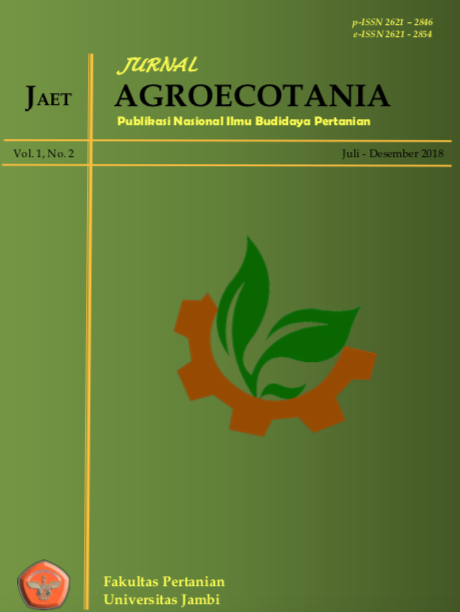PENINGKATAN KETERSEDIAAN P ULTISOL DENGAN PEMBERIAN FUNGI MIKORIZA ARBUSKULAR
DOI:
https://doi.org/10.22437/agroecotania.v1i2.6340Abstract
Ultisol merupakan lahan kering masam yang memiliki tingkat kesuburan dan produktivitas yang rendah salah satunya adalah ketersedian P. Kandungan P Ultisol sebagian besar di fiksasi oleh Al3+ sehingga P menjadi tidak tersedia. Fungi Mikoriza Arbuskular (FMA) dapat dijadikan sebagai alternatif dalam meningkatkan kandungan P-tersedia. Penelitian ini bertujuan untuk meningkatkan P-tersedia pada Ultisol dengan pemberian FMA. Penelitian ini menggunakan Rancangan Acak Kelompok (RAK) dengan 6 perlakuan dan 4 kelompok yaitu M0 = tanpa pemberian FMA + pupuk P rekomendasi, M1 = 10 g FMA tanaman-1 + 80% pupuk P rekomendasi, M2 = 20 g FMA tanaman-1 + 60% pupuk P rekomendasi, M3 = 30 g FMA tanaman-1 + 40% pupuk P rekomendasi, M4 = 40 g FMA tanaman-1 + 20% pupuk P rekomendasi dan M5 = 50 g FMA tanaman-1 + tanpa pupuk P. Pupuk dasar yang digunakan adalah Urea 75 kg ha-1 (diberikan 1â„2 dari rekomendasi), SP36 100 kg ha-1 (diberikan sesuai dengan perlakuan) dan KCl 100 kg ha-1. Pengamatan yang dilakukan yaitu pengamatan sifat kimia tanah awal dan akhir penelitian.. Data dianalisis dengan sidik ragam dan kemudian di uji lanjut untuk mengetahui perbedaan antar perlakuan dengan dilakukan Duncan Multiple Range Test (DMRT) taraf 5%. Hasil penelitian diperoleh bahwa pemberian FMA mampu meningkatkan ketersediaan P Ultisol sebesar 38,57% apabila dibandingkan dengan tanpa pemberian FMA.
Downloads
Downloads
Published
Versions
- 2019-02-11 (1)
- 2019-02-11 (1)
Issue
Section
License
Please find the rights and licenses in Indonesian EFL Research & Practice.
- License
The non-commercial use of the article will be governed by the Creative Commons Attribution license as currently displayed on Creative Commons Attribution-NonCommercial-ShareAlike 4.0 International License.
- Author’s Warranties
The author warrants that the article is original, written by stated author(s), has not been published before, contains no unlawful statements, does not infringe the rights of others, is subject to copyright that is vested exclusively in the author and free of any third party rights, and that any necessary written permissions to quote from other sources have been obtained by the author(s).
- User Rights
Indonesian EFL Research & Practice's spirit is to disseminate articles published are as free as possible. Under the Creative Commons license, Indonesian EFL Research & Practice permits users to copy, distribute, display, and perform the work for non-commercial purposes only. Users will also need to attribute authors and Indonesian EFL Research & Practice on distributing works in the journal.
- Rights of Authors
Authors retain the following rights:
- Copyright, and other proprietary rights relating to the article, such as patent rights,
- The right to use the substance of the article in future own works, including lectures and books,
- The right to reproduce the article for own purposes, provided the copies are not offered for sale,
- The right to self-archive the article.
- Co-Authorship
If the article was jointly prepared by other authors, the signatory of this form warrants that he/she has been authorized by all co-authors to sign this agreement on their behalf, and agrees to inform his/her co-authors of the terms of this agreement.
- Termination
This agreement can be terminated by the author or Indonesian EFL Research & Practice upon two months’ notice where the other party has materially breached this agreement and failed to remedy such breach within a month of being given the terminating party’s notice requesting such breach to be remedied. No breach or violation of this agreement will cause this agreement or any license granted in it to terminate automatically or affect the definition of Indonesian EFL Research & Practice.
- Royalties
This agreement entitles the author to no royalties or other fees. To such extent as legally permissible, the author waives his or her right to collect royalties relative to the article in respect of any use of the article by Indonesian EFL Research & Practice or its sublicensee.
- Miscellaneous
Indonesian EFL Research & Practice will publish the article (or have it published) in the journal if the article’s editorial process is successfully completed and Indonesian EFL Research & Practice or its sublicensee has become obligated to have the article published. Indonesian EFL Research & Practice may conform the article to a style of punctuation, spelling, capitalization, referencing and usage that it deems appropriate. The author acknowledges that the article may be published so that it will be publicly accessible and such access will be free of charge for the readers.










